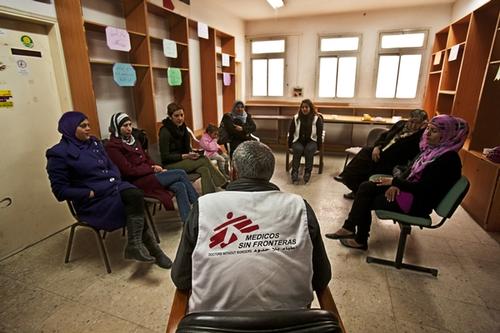This piece was written by a Médecins Sans Frontières (MSF) psychologist about a patient named Jawad. It’s part of a series of stories about MSF patients affected by the Israeli-Palestinian conflict, and who receive assistance from MSF mental health teams in Hebron and in East Jerusalem. The stories are collected by the MSF teams and seek to reflect the reality of daily life under occupation for MSF patients and the people who treat them.
Today seems like another typical day in the MSF office in Hebron, Palestine. But it’s not a typical day for Jawad, as he has decided that today he wants to talk about his time in prison.
I have now been working with Jawad for almost eight months, since I arrived in Hebron, the most important city after Jerusalem for both Islam and Judaism. It is the only city in the West Bank where Jewish settlers live within the boundaries of the city itself. Because of its religious and political significance, Hebron is often a hotspot for violent clashes between Palestinians and Israelis, and the city and surrounding villages are closely monitored by a heavy military and police presence.
Severe post-traumatic stress
Jawad is from one of the villages surrounding Hebron. I have met him almost every week, excluding the occasions when he had been re-arrested or detained by the military or police. Jawad’s progress has suffered a setback each time he is re-contacted by police. Jawad was initially referred to MSF by the International Committee of the Red Cross following his release from jail. At his initial assessment, he showed severe post-traumatic symptoms but until now he has never talked about what happened during his imprisonment.
The session begins and we sit opposite each other. Jawad is a thin, well-dressed young man of 28 years, whose manner reveals a quiet intelligence. He smiles more now than when we first met, but there is always a seriousness behind his eyes and when he becomes stressed he rubs his eyes with his fingers and looks beyond us to the wall.
Countless interrogations
When reminded that we are supposed to deal with the topic of jail, Jawad looks away saying “I’ve already told you about my time in there”, and looks surprised when I remind him that he has in fact told me very little. Trust is of course a big issue in the Palestine especially for a man who has been arrested for political activism and has undergone countless interrogations in and out of jail. Much of our sessions have been about forming trust, especially considering there are elements of therapy which are similar to the interrogation process.
He tells me he was 22 years old when he started becoming more aware of the situation in Gaza. He began to meet with other politically aware men and women from his university and attended some local demonstrations. Then one day when he was at home working on his computer, he heard a commotion outside. The Israeli Defence Force had come to the house. He was arrested and detained for what was to become a sentence of four and-a-half years.
“My whole world fell apart”
Jawad describes his time in jail in ‘phases’. Following the first phase of interrogations, during which he felt proud for keeping his silence, Jawad told me he was placed in a room with other prisoners. Following the stress of the interrogations, he started to allow himself to relax and felt relieved by the support he received from his comrades. However, when the soldiers returned he felt something was wrong. Then suddenly it became apparent that his fellow prisoners were ‘enemies’. All his conversations and movements had been recorded, his silence was broken and now the interrogators were about to step up their pressure. At this point he told me “my whole world fell apart”, and “I changed as a person”.
He remembers phase two as being much worse. The methods used during this phase were extreme and he doesn’t remember a lot, except the periods he spent in ‘isolation’. It was difficult for Jawad to talk about his experiences in words, but the images, sounds and tactile sensations he felt during this time were still returning to him every night in terrifying and confusing nightmares.
Handcuffed to the operating table
Unfortunately, from here things got even worse. Jawad remembers the third phase as when he got sick. After being rushed to the prison hospital it became apparent that his appendix had burst and that he needed emergency surgery. The next thing he remembers is waking up from the anaesthetic, still lying on the operating table, and looking down to see his bloody, open abdomen. At this point the distress must have been too much for him and he experienced a flashback. He was no longer in surgery, but back in the interrogation room, once again surrounded by guards - open, vulnerable and unable to move as he was handcuffed to the operating table. Although the flashback ended, waking up to reality did not help matters, with three armed guards appointed to watch him in bed while he recovered.
From this point Jawad’s mental state deteriorated rapidly. He became physically unwell, but didn’t trust doctors to examine him. He developed severe depression and isolated himself completely from all relationships. After his release, he commented to me more than once that he would rather go back to jail than live his life as it had become.
Through these sessions, MSF is trying – in spite of everything – to restore an acceptable level of physical and psychological health. In addition to the Hebron programme, the organization also operates a psycho-medical-social programme in Nablus and East Jerusalem. MSF has been working in Palestine and in Gaza since 2000.
The week after this was written, Jawad was re-arrested and detained again for further questioning.



